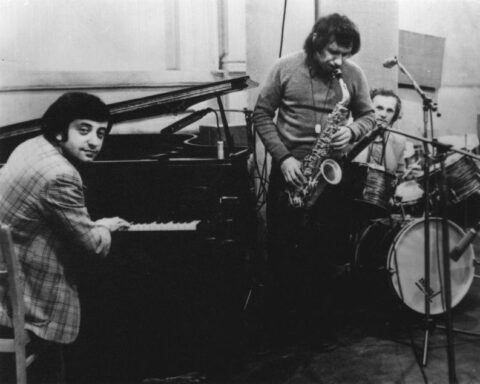
“I was very pleased with the term the NEA came up with, ‘jazz advocate,’” says Dan, the fourth recipient of the NEA’s A. B. Spellman Award. “I’ve always thought of myself as an advocate first and foremost. From the start, I’ve wanted to do something for the welfare of the music.”
In Living With Jazz, a 700-page compendium of his writings over the decades, Morgenstern describes his upbringing in poignant and sometimes harrowing detail. Born in Germany in 1929 and raised in Vienna, he personally witnessed the rise of the Nazis. Hitler’s adoring crowds proved “one of the ugliest and most unmusical sounds I’d yet heard,” he writes. He fled with his mother to Denmark, and after the Nazis occupied that country as well, to Sweden. In the midst of all this, he kindled a lifelong love of American jazz. He arrived in New York in 1947, in time to visit 52nd Street and see Charlie Parker and Billie Holiday in the flesh.
As editor of the school weekly at Brandeis University, Dan published his first jazz writings and received encouragement from Nat Hentoff, at the time Down Beat’s Boston correspondent, now a fellow NEA Jazz Master. “I didn’t see myself becoming a professional jazz writer,” Dan recalls. But after stints at the New York Post and Jazz Journal, Dan was tapped to become the last editor of Metronome. “By then I was bitten by the bug, and I knew I wanted to do it for a living.”
[pullquote]For a man who discovered jazz by winding up his mother’s portable phonograph, Morgenstern seems unperturbed by new music technology.[/pullquote]
Hired as Down Beat’s New York editor in 1964, Morgenstern moved to Chicago to become chief editor in 1967. Though he returned to New York in 1970, he retained the editor’s post until 1973. “I still find it hard to believe that we managed to publish twice a month back then,” he marvels. “This was before the Internet or even the fax. In those days the AACM was just coming into its own, and there were a lot of things going on in the jazz world around civil rights. After I returned to New York there was the Jazz and People’s Movement. As the saying goes, ‘May you live in interesting times.’ Well, those were interesting times.”
Following his Down Beat tenure, Morgenstern became involved in teaching jazz history. In 1976 he took his current job with IJS. Originally founded by scholar Marshall Stearns, who ran it out of his Greenwich Village home, the IJS collection moved in 1967 to New Jersey’s Rutgers University, where it remains to this day. “It wasn’t very prominent at Rutgers for some time,” Dan recalls. “I was the first person with the title of director. By now, [associate director] Ed Berger, [head of technical services and sound archivist] Vincent Pelote and I have been together for 30 years. In terms of the jazz world, that makes us longer-running than the Modern Jazz Quartet. Maybe we should be called the Ancient Jazz Trio.”
More than just a repository of vintage recordings, instruments and memorabilia, the IJS under Morgenstern is a visionary, ever-evolving force in the current jazz world. “We are living in the present and very much involved in furthering the music,” says Dan. He mentions Rutgers’ affiliated Graduate Program in Jazz History and Research, where he serves as a part-time faculty member. “We have the Annual Review of Jazz Studies,” he adds, “which was the first English-language scholarly jazz periodical, and the series of books we’ve done with Scarecrow Press, over 50 volumes at this point. And there’s also our radio show on WBGO-FM, ‘Jazz From the Archives,’ which marked its 30th anniversary this year.”
While journalists and scholars scour the IJS for historic recordings, Morgenstern and his staff are adding more material all the time. “We need to keep up with everything that comes out,” he remarks, “and now we’re collecting ourselves out of space, which is good.” Digitization and online accessibility are major current initiatives. For a man who discovered jazz by winding up his mother’s portable phonograph (“I had to work for my magic sounds,” he writes in Living With Jazz), Morgenstern seems unperturbed by new music technology. “But we’re not going to become a virtual collection,” he clarifies. “We’re going to hang onto the material aspect of all this.”
From 1990 until 2004, Morgenstern served on the committee of the prestigious JAZZPAR Prize, administered by his former home country of Denmark. “I had a chance to visit Denmark every year and reconnect in many ways,” Dan reflects. “I’m very emotionally attached to the country, not just because it’s been so hospitable to jazz. I enjoyed my years there in spite of the bad times. And the Danish people saved my life and those of my relatives and friends.”
With seven Grammys for Best Album Notes and two ASCAP Deems Taylor Awards under his belt, Morgenstern remains one of the most trusted voices on jazz — past, present and future. In a 1958 piece for Jazz Journal titled “Cats and Categories,” he was critical yet appreciative of a bold new artist, Ornette Coleman. Musing on the album title The Shape of Jazz to Come, Dan wrote: “[T]his music is not the jazz of the future but a sincere and somewhat raw attempt to chart new tributaries. Eventually, the essence will be distilled and merge with the basic current of jazz. And that’s more than enough for any new idea.” Aside from being fundamentally accurate, this is pure Morgenstern: shorn of hyperbole, unsentimental, cutting to the core of the music’s logic and still conveying warmth and enthusiasm for the art. There’s no manual on how to write about jazz, but Morgenstern’s example comes pretty close.
Note: An earlier version of this article appeared in the November 2007 issue of Down Beat.





